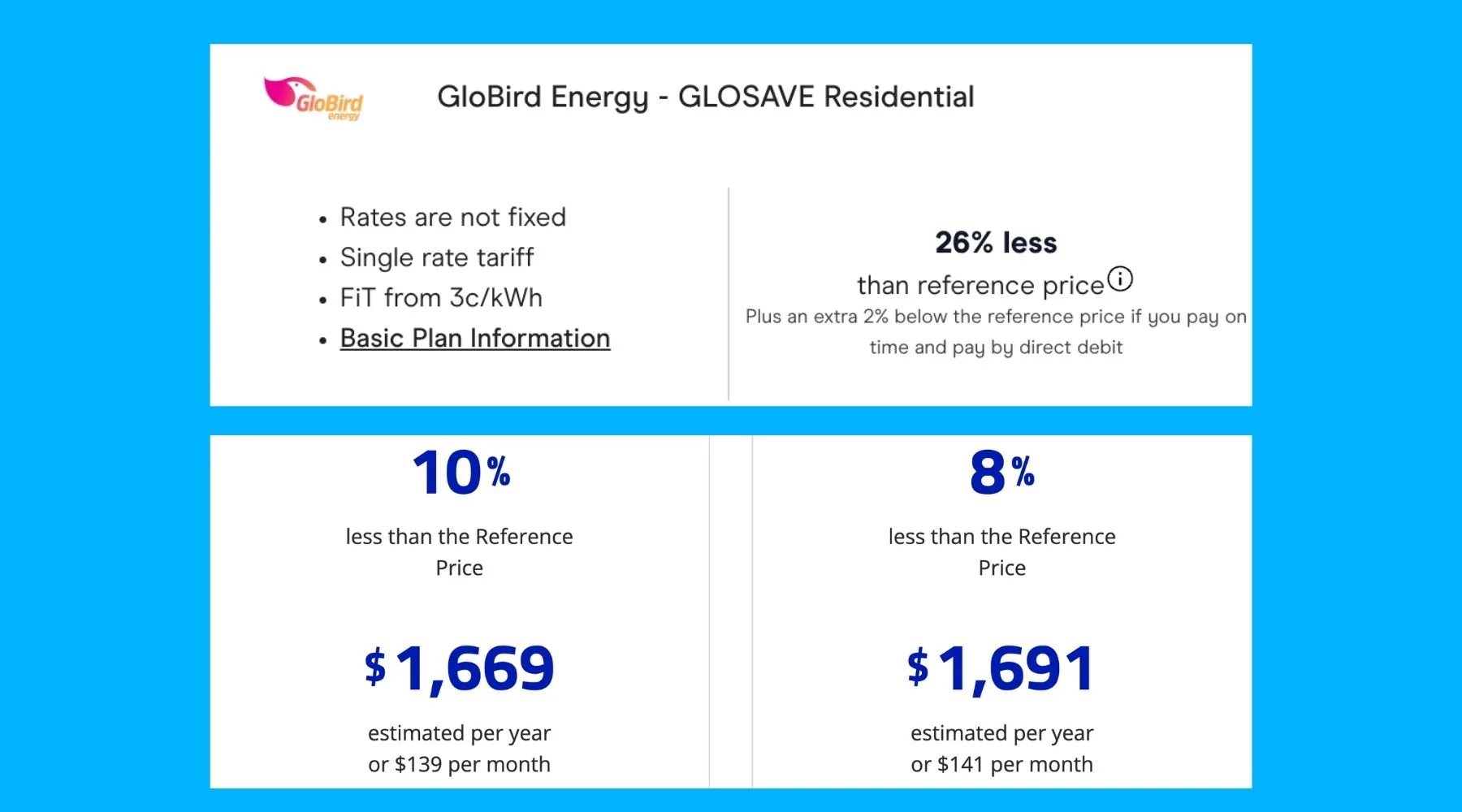Key takeaways
- You might be overpaying on your electricity bill if you're not familiar with the Default Market Offer (DMO) or the reference price.
- The DMO is the maximum price energy retailers can charge customers on a basic standing offer plan.
- The reference price is essentially the same as the DMO but is mainly used in advertising to help you compare other plans.
- The DMO and reference price apply to households and small businesses in New South Wales, South Australia, and South East Queensland. Victoria has a similar system called the Victorian Default Offer (VDO).
What is a Default Market Offer?
The DMO is the maximum price that electricity retailers can charge for standing offer plans.
We'll get into more detail on standing offers later in the guide, but for now, just know these plans usually apply to a small group of people who don't compare or shop around for a better energy deal.
The DMO is set by the Australian Energy Regulator (AER) each year on 1 July and applies to households and small businesses in NSW, SA, and South East QLD.
It acts as a safety net to prevent retailers from overcharging customers on standing offer plans.
How is the DMO calculated?
The DMO takes a range of costs into account before a final figure is set each year. It reflects what it typically costs a retailer to supply electricity to a household or small business.
This includes wholesale electricity prices, network charges, environmental scheme costs, retail operating expenses and a reasonable profit margin.
What is a reference price?
The reference price is essentially the same as the DMO, but it's just the label used on provider and comparison websites (such as Finder) to compare all energy offers against the DMO.
These offers are usually displayed as a percentage above or below the reference price.
So yes, they're both similar, but think of the DMO as the price ceiling and the reference price as a comparison tool.
Here's an example of how it can look:

What's the Victorian Default Offer then?
Because Victoria's energy market is regulated by the Essential Services Commission, some of the terminology and rules differ slightly.
Instead of the DMO, Victoria has the VDO. They serve essentially the same purpose.
What about other states and territories?
The electricity markets in Tasmania, Western Australia, Northern Territory, regional Queensland and the Australian Capital Territory are regulated by state governments and other authorities.
They'll have their own rules and regulations around pricing and customer protections.
If you live in these parts of the country, it's important to check the local energy regulator's guidelines to understand your electricity plan.
Haven't shopped around for a new electricity plan in over 12 months? Compare energy plans to find a cheaper deal.
What are the Default Market Offer and Victorian Default Offer prices for 2025-26?
Unfortunately, both DMO and VDO price have increased this year by as much as $280, with NSW seeing the biggest rise.
Here's a look at the DMO prices first, including rates for customers on a controlled load tariff, which applies to appliances like hot water systems or pool pumps that are metered separately.
| State/Network | Without controlled load (Residential) | With controlled load (Residential) | Small business without controlled load |
|---|---|---|---|
| NSW (Ausgrid) | $1,965 (8.6% or +$155) | $2,717 (8.3% or +$208) | $4,977 (7.9% or +$365) |
| NSW (Endeavour) | $2,411 (8.5% or +$188) | $3,072 (9.7% or +$271) | $4,775 (8% or +$353) |
| NSW (Essential) | $2,741 (9.1% or +$228) | $3,211 (9.6% or +$280) | $6,222 (8.5% or +$489) |
| QLD (Energex) | $2,143 (3.7% or +$77) | $2,425 (0.5% or +$11) | $4,294 (4.2% or +$33) |
| SA (SA Power Networks) | $2,301 (3.2% or +$71) | $2,821 (2.3% or +$64) | $5,541 (3.5% or +$189) |
Here's a look at VDO prices for 2025-26:
| AusNet | CitiPower | Jemena | Powercor | United Energy | Victorian average | |
|---|---|---|---|---|---|---|
| 2024–25 (final decision) | $1,902 | $1,456 | $1,664 | $1,699 | $1,554 | $1,655 |
| 2025–26 (final decision) | $1,908 | $1,546 | $1,638 | $1,703 | $1,579 | $1,675 |
| Change in $ | $6 | $90 | -$26 | $4 | $25 | $20 |
| Change in % | 0.3% | 6.2% | -1.6% | 0.2% | 1.6% | 1.2% |
For small businesses on a VDO, annual prices will rise by $90 across the five distribution zones to $3,620.
What's the difference between standing offers and market offers?
Standing offers are the default electricity plans customers are put on if they don't actively choose a plan.
The price is set in line with the DMO or VDO.
Market offers are designed by energy retailers and are more often than not cheaper than the standing offer.
Standing offer
- Retailers are required to provide a standing offer
- Terms and conditions are set by the energy regulator
- Rates are capped so that you don't pay an unfair amount
- Your price can't change more than once per six months
- Usually no discounts or incentives when you sign up
- Usually more expensive than market offers
Market offer
- Market offer prices are generally competitive compared to standing offers
- Retailers often provide discounts and incentives to attract customers
- Terms and conditions vary and are set by each retailer
- Market offer prices can change with at least 5 business days' notice.
- Retailers must notify you in writing before a price change takes effect.
With these differences in mind, it's always better to choose a market offer that's cheaper than the standing offer. Check your last bill or contact your energy provider if you don't know what type of plan you're currently on.
To highlight the difference even more, single-rate market offers listed in Finder's database can be as much as 26–28% lower than the reference price or VDO.
So shopping around for a better energy deal could save you hundreds of dollars. Start comparing!
Sources
More guides on Finder
-
Will you pay more for energy with the 3 hours of free electricity offer?
Energy giants are asking for the Solar Sharer offer to be delayed.
-
Cheap energy plans
Compare the cheapest electricity and gas plans available in your state.
-
Best electricity and gas sign-up deals
Get bonus rewards points and bill credit with some of the best energy offers available this month.
-
What is the average electricity and gas bill in Australia?
Check your quarterly electricity and gas bill against the average in your state.
-
Compare energy providers in SA
You have the power to switch energy plans in Adelaide and the rest of South Australia. Luckily it only takes minutes to hunt down the cheapest options with us.
-
Powershop review
Buy your electricity with Powershop and get flexible power options, green-friendly energy and online discounts.
-
Compare energy plans in QLD
There’s no time for snoozing. Hunt down the best electricity and gas providers in QLD with us so you can switch and save.
-
Compare energy plans in NSW (without draining your brainpower)
Whether you're in Sydney or regional NSW, comparing energy plans doesn't have to be a headache.
-
Compare energy plans in Victoria
Don’t snooze. It’ll take just a few quick clicks to start comparing electricity and gas plans in Victoria and Melbourne.
-
Compare electricity and gas providers in Canberra and the ACT
Residents of the ACT have several electricity and gas providers to choose from.
